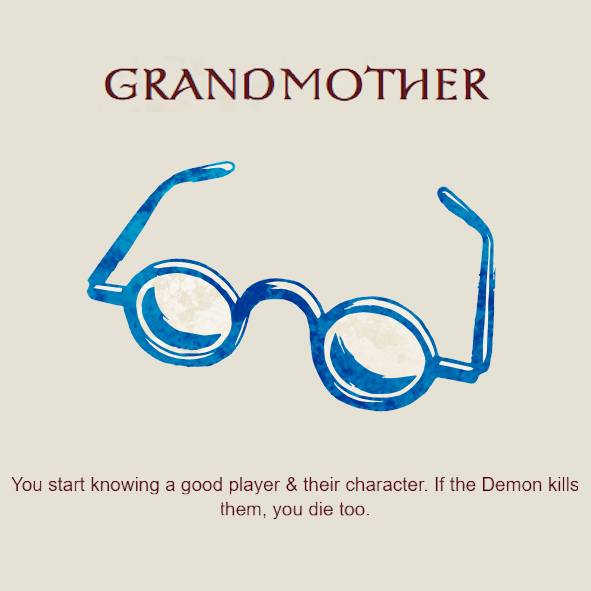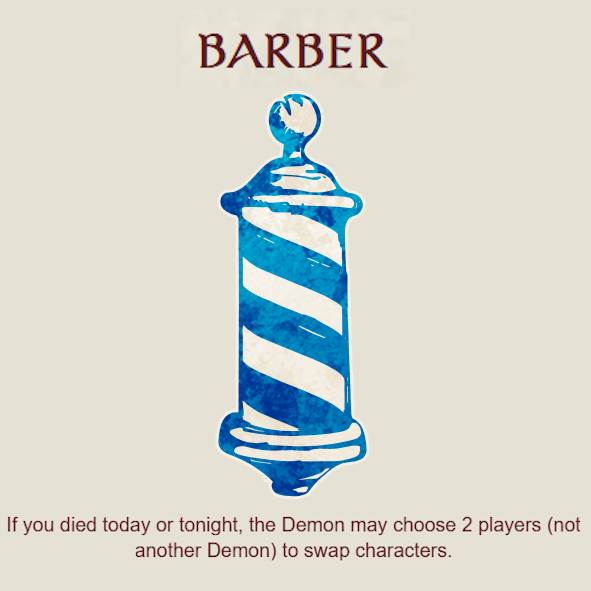Blood on the Clocktower
A thick mist hangs over the town of Ravenswood Bluff. The residents awake to find a mangled body at the foot of the clocktower. One of us did this... but who?
Blood on the Clocktower is a hidden role social deduction game in the vein of Werewolf or Mafia. It elevates the basic premise of these games with several clever innovations that really make this game something special.
BotC is great. You should play it! And I'm going to tell you why.
What is Blood on the Clocktower?
BotC is a hidden role game for (usually) 6 to 16 players. Each player is secretly assigned a "good" or "evil" role. The evil team consists of one "demon" and a few "minions", and they start knowing who each other are. The rest of the players are on the good team, and their goal is to find the demon and execute them via a group vote. Games alternate between "day" phases, where the players vote to execute each other, and "night" phases, where the demon gets a chance to kill their fellow players.
Okay... but what makes it special?
If you've played Mafia, Werewolf, or any of their spin-offs, this probably all sounds quite familiar to you. While these games are fun, they also suffer from a few fundamental game design flaws that, in my opinion, prevent them from being truly great games. Namely...
- A player's ability to interact with the game varies wildly depending on their role. Villagers, in particular, often have very little to "do" in a game like this... and usually most players are villagers!
- Information gained though characters' abilities is often either game-solving or useless, meaning wins and losses either come down to the luck of the draw or arguments over who is and is not lying.
- Players are eliminated from the game when they die. With big groups and long games, the first few eliminees are excluded from interacting with the rest of the group for an extended period of time, which is just no fun.
- One player has to take on a "facilitator" role to ensure the game runs smoothly, and this role can feel more like a chore than like playing a game.
Blood on the Clocktower blows addresses these problems with a few simple yet powerful design innovations:
- Everyone gets a unique power that impacts the game. No villagers here.
- Lots of roles receive information, but information can be tampered with in a variety of ways. Even when people tell the truth, they might be spreading false information.
- Dying does not eliminate you from the game! Your role is not revealed, and you still get to talk to people, offer theories, and even vote (once) after death.
- The facilitator -- in the parlance of this game, the "storyteller" -- has a lot of interesting and fun decisions to make, and actually feels like they're playing a game.
There's the elevator pitch! If any of this intrigues you, I recommend checking out some BotC content to get a feel for what the game is like in practice. There's been a huge proliferation of BotC videos recently, but here's some recommendations for places to start...
- No Rolls Barred play Blood on the Clocktower. Funny, dramatic, and a great way to get acquainted with the game. They've done an entire series on BotC, so there's plenty more to watch if you enjoy this.
- Yogscast Plays Blood on the Clocktower in Minecraft. What it says on the tin. Another great entry point, and a bit faster-paced than the NRB video.
- Good Time Society plays Blood on the Clocktower. Another very informative and theatrical live play.
A catalog of some memorable games
...I'm the what??
Relevant characters: Barber, Grandmother, Marionette
Lying, misleading, and spreading chaos are some of my favorite things to do in this game. So I was counting my lucky stars when I managed to pull the demon token in a 15-player game. What's more, I was informed that one of my loyal minions this game would be the Marionette.
![Marionette: You think you are a good character, but you are not. The Demon knows who you are. [You neighbor the Demon]](/images/misc/mario.png)
Some people immediately inform their marionette that they are actually on the evil team, while others like to string them along as long as possible. I'm in the latter category. Luckily, keeping my Marionette in the dark was going to be easy this game, as we had a Grandmother who, through a fateful bit of poisoning, was falsely informed that the Marionette's fake good identity was truthful.

The Marionette was so trustworthy, and so convinced she was on the good team, that it was actually becoming a problem, because eventually she was going to set her sights on me.
Then the Barber died, and I had a very funny idea

My poor Marionette was woken that night by the storyteller and informed that A) she is now the demon, B) she is on the evil team, and C) her alignment has not changed. I, of course, was now the marionette, and my only goal for the rest of the game was to leech suspicion away from my demon who, to her credit, adapted to the new situation quickly and was able to carry us to a win.
Sometimes the best liars are the ones who don't know that they're lying!